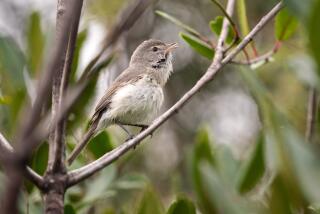Ducks, Geese Hog Southland Pools, Ponds
- Share via
Ah, June, time to hoe the garden, drag out the barbecue and--chase the ducks out of the swimming pool?
In what has become an annual rite in Southern California, flocks of ducks and geese are briefly setting aside their usual migratory ways and making themselves comfortable in swimming pools, fountains, back-yard ponds and even an occasional Jacuzzi.
But the numbers of errant waterfowl this year have astonished even veteran duck-trapper Michael Chill, who attributes the rise in part to a drought-induced shortage of natural landing spots.
Already things have gotten so bad that a federal agency has taken the unusual step of fining a group of residents who tampered with goose eggs.
“It’s unbelievable,” said Chill, a professional trainer who donates his time to remove wayward ducks and geese from urban water holes. Chill, who has been netting ducks across Southern California for five years, said he has been asked to remove everything from a single mallard to a flock of more than 100 birds.
This year, Chill has received so many duck calls--he has a three-week waiting list--that he wonders whether he should start charging for the service. “I could do this full time,” he said. Perhaps, he mused, he could call the new company “Duck Busters.”
Homeowners with unwanted waterfowl are referred to Chill by the U.S. Fish and Wildlife Service. Paul Weyland, a special agent at the agency’s Los Angeles office, said the service has had two or three complaints a day about ducks and geese since March. The office normally gets two or three such calls a week this time of year.
“I think it’s because of the drought,” Weyland said. Chill has trapped and relocated hundreds of ducks this spring. He has never had so many calls, he said.
Officials with animal-control departments, the Audubon Society and the Society for the Prevention of Cruelty to Animals in Los Angeles and Orange counties said they were unaware of an increase in the number of avian intruders.
Southern California lies under a migratory flyway so it’s not unusual for an occasional duck to find a swimming pool more inviting than the long trip south to Mexico, said Lt. James Phipps of the city animal shelter in North Hollywood.
But Richard Kust, president of the Sea and Sage Chapter of the National Audubon Society in Orange County, said this year’s drought appears to have “stressed” some ducks.
“I’ve seen them here in Irvine in very little puddles, just four feet across with a pair of mallards. . . . Apparently other ponds are not available to them. They’re forced to go to other places.”
At Friendly Woods Estates, a condominium complex in Whittier, residents were forced to get creative in battling a pair of ducks that have taken a liking to their swimming pool for the past six years, said former pool manager Wayne Wilson.
“Last year we got a plastic snake,” he said. “It scared some of the young kids.” It didn’t, however, scare the ducks.
“This year we bought an owl,” he said.
The mallards--this time there were two males, a female and a pair of ducklings--left about a week ago, but Wilson said he’s not sure whether the statue of the owl or the urge to move on prompted the departure.
In Fullerton, the swimming pool at The Greenhouse apartments was off-limits to residents the entire month of April because four mallards had decided to make it their home.
Tenants were very unhappy, said apartment manager Helene Brady. “They said, ‘Why the ducks and not us?’ ”
Though the 37-foot-long lap pool was cleaned every few days, Brady said bacterial counts remained high all month, so the pool could not be used as long as the ducks stayed.
Finally, about three weeks ago, the ducks “just left--and they haven’t been back since--thank God,” Brady said.
Brady said the problem of the ducks is an annual one--”every year at mating time.” And every year, “there’s nothing you can do about it. They’re protected by law.”
That’s true. Ducks and geese are among the birds protected by the Migratory Bird Treaty Act, Weyland said. “Under federal law, you’re not allowed to move or trap them” without a permit, he said.
A homeowners association in Valencia discovered the power of federal bird laws when it was fined $250 in April for moving six eggs from a nest built by Canada geese that settled near the lake by the Lakeshore condominiums.
After some of the eggs began to rot, the association asked a gardener to remove them. He unknowingly removed some fresh eggs as well, Weyland said. After some residents complained, the Fish and Wildlife Service investigated and issued a notice of violation
“The gardener was only doing what he was told to do,” Weyland said. “No one intended to kill any birds.” Still, the agency felt duty-bound to penalize the homeowners.
Experts warned homeowners against feeding wild ducks or geese. That only encourages them to settle down. “It interrupts the food chain,” Chill said. “If they’re truly wild ducks, they shouldn’t be fed.”
Chill, who has a permit to trap and move the wild birds, admitted he’s not partial to ducks. He helps them out of a sense of duty. “I love wolves and predatory birds,” he said.
Times staff writer Lanie Jones contributed to this story.
More to Read
Sign up for Essential California
The most important California stories and recommendations in your inbox every morning.
You may occasionally receive promotional content from the Los Angeles Times.










